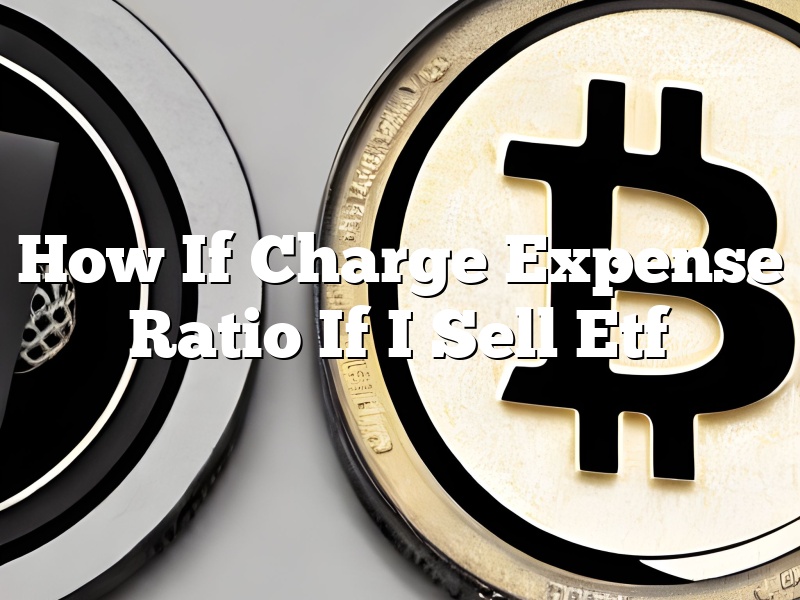How If Charge Expense Ratio If I Sell Etf
When you sell an ETF, the brokerage firm will charge you an expense ratio, which is a percentage of the total value of the shares that you sold. This fee is designed to cover the costs incurred by the brokerage firm for managing and selling ETFs. The expense ratio can be as high as 2.5% of the total value of the shares that you sell.
Contents
What happens to ETF when you sell?
When you sell an ETF, the fund’s sponsor will sell the underlying securities and use the proceeds to buy back shares from the ETF’s investors. This process is known as “creation and redemption.”
Are there fees for selling ETF?
Are there fees for selling ETF?
Yes, there are fees for selling ETFs. When you sell an ETF, you may be charged a commission by your broker. In addition, the ETF may have a redemption fee. The redemption fee is a charge assessed by the ETF issuer when an investor sells shares of the ETF. The redemption fee is typically a percentage of the fund’s assets and is designed to discourage investors from selling their shares shortly after buying them.
How are expense ratios taken out of ETFs?
When you invest in an ETF, you’re generally investing in a basket of assets that are designed to track a specific index. An ETF’s expense ratio is the fee that the fund charges to its investors to cover its costs. This fee is taken out of the fund’s assets each year and is used to pay for the fund’s management and other operating expenses.
The expense ratio for an ETF can range from a few basis points (0.03% or less) to more than 1%. It’s important to be aware of an ETF’s expense ratio before you invest, as it can have a significant impact on your overall return.
There are a few ways to reduce the impact of an ETF’s expense ratio on your portfolio. One is to invest in ETFs that have a lower expense ratio than their peers. Another is to invest in ETFs that track indexes with lower fees. You can also choose to invest in ETFs that are tax-efficient, as they tend to have lower expenses than their taxable counterparts.
It’s important to remember that an ETF’s expense ratio is just one factor to consider when investing. Other factors, such as the ETF’s underlying holdings and the market conditions at the time, can also have a significant impact on your return.
Are expense ratios automatically deducted?
Are expense ratios automatically deducted?
This is a question that many investors may ask themselves, and the answer is not always straightforward.
expense ratios are the fees that mutual funds and exchange-traded funds charge their shareholders for the management of their money. these fees are expressed as a percentage of the fund’s assets, and they cover the costs of running the fund, such as research, trading, and administrative expenses.
generally, the expense ratio is automatically deducted from the fund’s assets. this means that the fund’s shareholders do not have to take any action to pay the fee.
However, there are a few exceptions to this rule. for example, some funds may waive their expense ratios for a certain period of time after purchase. in addition, some funds may charge a back-end load, which is a fee that is paid when the investor sells the fund.
Overall, the expense ratio is a important factor to consider when investing in a mutual fund or exchange-traded fund. by understanding how these fees are calculated and what they cover, investors can make more informed decisions about where to put their money.
How often is expense ratio charged on ETF?
When you invest in an ETF, you will likely have to pay an expense ratio. This is a fee that is charged by the fund provider in order to cover the costs of managing the fund. How often this fee is charged can vary, depending on the ETF.
Some ETFs charge an expense ratio on a monthly basis, while others charge it on a yearly basis. There are also some funds that charge a fee each time you buy or sell shares. It is important to be aware of the fee schedule before you invest in an ETF.
The expense ratio can have a big impact on your returns. It is important to make sure that the ETF you choose has a low expense ratio, so that you can keep more of your money invested.
There are a number of different factors to consider when choosing an ETF. Make sure to include the expense ratio in your decision-making process. By doing so, you can be sure that you are getting the best return on your investment.
Do you pay taxes on ETFs if you don’t sell them?
When you purchase an ETF, you are buying a piece of the underlying assets. For this reason, you are not required to pay taxes on the ETF until you sell it. If you hold the ETF for more than a year, you will pay long-term capital gains taxes on the profits. If you hold it for less than a year, you will pay short-term capital gains taxes.
Can you sell ETFs immediately?
Can you sell ETFs immediately?
Yes, you can sell ETFs immediately. However, there may be times when you cannot sell an ETF immediately. For example, if the market is closed, you will not be able to sell the ETF. Additionally, you may not be able to sell an ETF if its price has fallen below its purchase price.






0